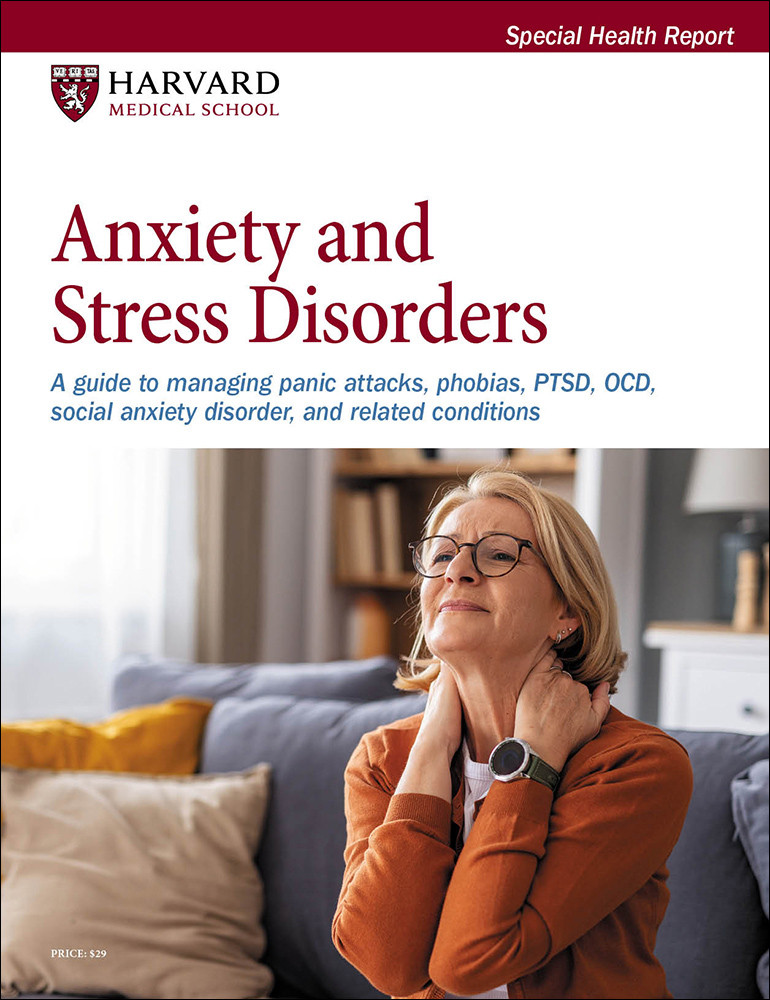When everyday noises upset you
If the sounds of chewing, sniffling, heavy breathing, and the like really bother you, you might be dealing with misophonia. Here's how to cope with this surprisingly common condition.
- Reviewed by Toni Golen, MD, Editor in Chief, Harvard Women's Health Watch; Editorial Advisory Board Member, Harvard Health Publishing; Contributor

Enduring a slurping spouse, joint-cracking colleague, or throat-clearing friend can be a sigh-inducing, eye-rolling experience. But the reaction goes beyond mere annoyance for people who respond to these everyday sounds — or others like snoring, sniffling, loud chewing, yawning, and heavy breathing — with agitation, rage, or disgust.
Their aversion is part of a strikingly common sensory processing disorder known as misophonia, which is characterized by an outsized emotional response to sounds others make. A study published online March 22, 2023, by the journal PLOS One estimates that nearly one in five adults deals with the condition, with women responding more intensely than men.
"They can't stand to be in the room with those sounds," says Dr. Michael Mufson, a psychiatrist and director of the Complex Diagnostic Center at Harvard-affiliated Brigham and Women's Hospital. "They try to avoid those situations, but it's almost impossible to do."
If you've never heard of misophonia, you're not alone. Only 14% of study participants were aware of the diagnosis before they were surveyed. But the condition's prevalence is emerging as long-held stigma eases, Dr. Mufson says.
"We're seeing more and more people coming out of the shadows with it," he says. "Before, people feared their doctor was going to call them crazy. But it's no longer a hidden disorder."
Feeling trapped and helpless
While scientists aren't sure why misophonia occurs, a 2022 study in Frontiers in Neuroscience suggests the disorder may have a unique "neural signature," meaning it's traceable to a distinct pattern of nerves in the brain. Older adults with misophonia have likely had it most of their lives — possibly never disclosing it due to stigma — but the condition can develop at any age, Dr. Mufson notes. "It's not uncommon that it goes undiagnosed," he says.
Eliminating culprits
Before pinpointing misophonia, doctors must carefully rule out other conditions that can resemble or overlap with it. These include obsessive-compulsive disorder, bipolar disorder, other sensory processing disorders, affective dysregulation (an impaired ability to tolerate or manage negative feelings), Asperger's syndrome (a form of autism), anxiety disorders, and post-traumatic stress disorder.
Not everyone with misophonia has the same sound triggers or responds with the same degree of aversion. Regardless, those affected often blame themselves for missing out on activities others take part in with ease. Feeling trapped and helpless when they can't escape sounds that irritate them, some affected individuals even lash out physically or verbally.
"They might avoid eating in restaurants or eat separately from their spouse or family," Dr. Mufson says. "Imagine feeling you have to leave when you're at the theater and a person coughs. It becomes socially impairing."
While misophonia has long gone unnoticed, treatment options are expanding. Doctors typically use a comprehensive approach that blends behavior-based therapies with medication. "It's not a disorder without hope," Dr. Mufson says.
Misophonia management
Cognitive behavioral therapy (CBT) is emerging as an evidence-backed treatment for misophonia, according to a small 2020 study published in Depression and Anxiety. More than a third of 54 participants who underwent CBT reported improvements in their misophonia symptoms as well as their ability to function socially and within their families. The benefits were still apparent a year later.
In a CBT program, the therapist first identifies a patient's individual sound triggers, then works with the patient to develop new responses. "We develop strategies and coping mechanisms to interrupt the rage and anxiety," Dr. Mufson says. "If the anxiety is too severe, then we start thinking of incorporating medication. If you can dampen the anxiety, you can really help people feel and function better."
People with misophonia can also ease sound aversions by
- wearing earplugs or headphones
- using white noise machines
- practicing deep breathing or muscle relaxation techniques.
If you know someone with misophonia, it's important not to criticize their symptoms, Dr. Mufson says. "Encourage them to go for treatment," he says. "It's also helpful if they get some brief, supportive counseling to empower them to seek treatment by helping them understand they're not crazy."
Image: © SteveLuker/Getty Images
About the Author

Maureen Salamon, Executive Editor, Harvard Women's Health Watch
About the Reviewer

Toni Golen, MD, Editor in Chief, Harvard Women's Health Watch; Editorial Advisory Board Member, Harvard Health Publishing; Contributor
Disclaimer:
As a service to our readers, Harvard Health Publishing provides access to our library of archived content. Please note the date of last review or update on all articles.
No content on this site, regardless of date, should ever be used as a substitute for direct medical advice from your doctor or other qualified clinician.
















